
Orchids are plants that belong to the family Orchidaceae, a diverse and widespread group of flowering plants with blooms that are often colourful and fragrant. Orchids are cosmopolitan plants that are found in almost every habitat on Earth except glaciers. The world's richest diversity of orchid genera and species is found in the tropics.
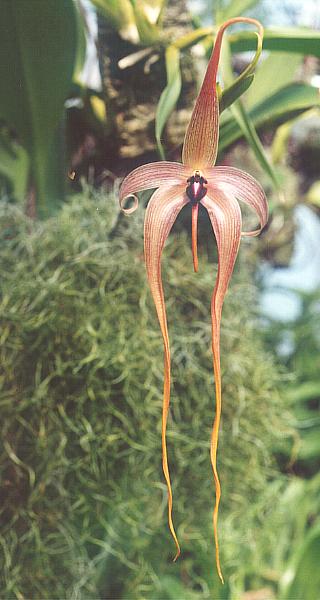
Bulbophyllum is a genus of mostly epiphytic and lithophytic orchids in the family Orchidaceae. It is the largest genus in the orchid family and one of the largest genera of flowering plants with more than 2,000 species, exceeded in number only by Astragalus. These orchids are found in diverse habitats throughout most of the warmer parts of the world including Africa, southern Asia, Latin America, the West Indies, and various islands in the Indian and Pacific Oceans. Orchids in this genus have thread-like or fibrous roots that creep over the surface of trees or rocks or hang from branches. The stem is divided into a rhizome and a pseudobulb, a feature that distinguished this genus from Dendrobium. There is usually only a single leaf at the top of the pseudobulb and from one to many flowers are arranged along an unbranched flowering stem that arises from the base of the pseudobulb. Several attempts have been made to separate Bulbophyllum into smaller genera, but most have not been accepted by the World Checklist of Selected Plant Families.

The Pleurothallidinae are a neotropical subtribe of plants of the orchid family (Orchidaceae) including 29 genera in more than 4000 species.

In the botanical classification of plants, Aeridinae Pfitzer is a subtribe of the tribe Vandeae whose representatives all have a monopodial growth habit and do not possess pseudobulbs.

Cypripedioideae is a subfamily of orchids commonly known as lady's slipper orchids, lady slipper orchids or slipper orchids. Cypripedioideae includes the genera Cypripedium, Mexipedium, Paphiopedilum, Phragmipedium and Selenipedium. They are characterised by the slipper-shaped pouches of the flowers – the pouch traps insects so they are forced to climb up past the staminode, behind which they collect or deposit pollinia, thus fertilizing the flower. There are approximately 165 species in the subfamily.

Friedrich Richard Rudolf Schlechter was a German taxonomist, botanist, and author of several works on orchids.

The taxonomy of the Orchidaceae (orchid family) has evolved slowly during the last 250 years, starting with Carl Linnaeus who in 1753 recognized eight genera. De Jussieu recognized the Orchidaceae as a separate family in his Genera Plantarum in 1789. Olof Swartz recognized 25 genera in 1800. Louis Claude Richard provided us in 1817 with the descriptive terminology of the orchids. (See External links below). The next step was taken in 1830-1840 by John Lindley, who recognized four subfamilies. He is generally recognized as the father of orchid taxonomy. The next important step was taken by George Bentham with a new classification, recognizing subtribes for the first time. This classification was first presented in a paper that Bentham read to the Royal Society in 1881. Then it was published in 1883 in the final volume of Genera Plantarum. The next great contributors were Pfitzer (1887), Schlechter (1926), Mansfeld (1937), Dressler and Dodson (1960), Garay (1960, 1972), Vermeulen (1966), again Dressler (1981). and Burns-Balogh and Funk (1986). Dressler's 1993 book had considerable influence on later work.

The Orchidoideae, or the orchidoid orchids, are a subfamily of the orchid family (Orchidaceae) that contains around 3630 species. Species typically have a single (monandrous), fertile anther which is erect and basitonic.
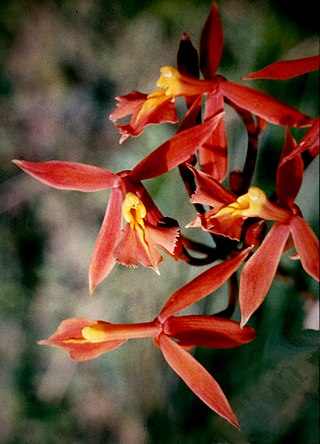
Epidendroideae is a subfamily of plants in the orchid family, Orchidaceae. Epidendroideae is larger than all the other orchid subfamilies together, comprising more than 15,000 species in 576 genera. Most epidendroid orchids are tropical epiphytes, typically with pseudobulbs. There are, however, some terrestrials such as Epipactis and even a few myco-heterotrophs, which are parasitic upon mycorrhizal fungi.
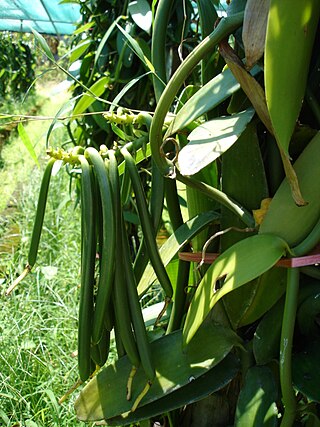
Vanilloideae is one of the subfamilies of orchids belonging to the large family Orchidaceae.

Jumellea is an orchid genus with 55 species native to Madagascar, the Comoros, the Mascarenes, and eastern Africa. In horticulture, it is often abbreviated Jum.
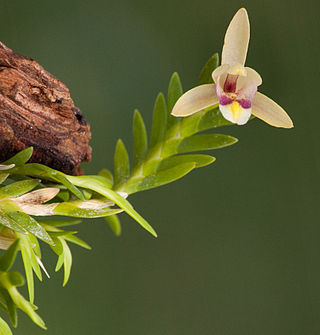
The Vandeae is a large monophyletic tribe within the family of orchids.
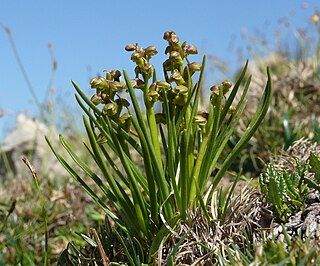
Chamorchis is a genus of flowering plants from the orchid family, Orchidaceae. It contains only one known species, Chamorchis alpina, known as the alpine dwarf orchid, false orchid or false musk orchid, and found in subarctic and subalpine parts of Europe: Scandinavia, the Alps, the Carpathians, northern European Russia.
Clematepistephium is a genus of flowering plants from the orchid family, Orchidaceae. It contains only one known species, Clematepistephium smilacifolium, endemic to the island of New Caledonia. Its closest relative is Eriaxis, also endemic to New Caledonia.

Dossinia is a genus of flowering plants from the orchid family, Orchidaceae. At the present time, only one species is accepted, Dossinia marmorata, endemic to Borneo.
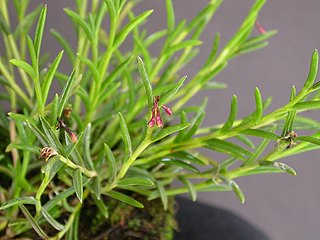
Jacquiniella is a genus of flowering plants from the orchid family, Orchidaceae. It is native to Mexico, Central America, the West Indies, and South America.

Pachites is a genus of flowering plants in the orchid family, Orchidaceae. It contains two known species, both endemic to South Africa. One of these, Pachites appressus, is very rare.

Dendrobieae is a tribe in the subfamily Epidendroideae, in the family Orchidaceae. The Dendrobieae are mostly tropical, epiphytic orchids which contain pseudobulbs.

Zygopetalinae is an orchid subtribe in the tribe Cymbidieae with 418 species.
Leslie Andrew Garay, born Garay László András, was an American botanist. He was the curator of the Oakes Ames Orchid Herbarium at Harvard University, where he succeeded Charles Schweinfurth in 1958. In 1957 he was awarded a Guggenheim Fellowship.

















